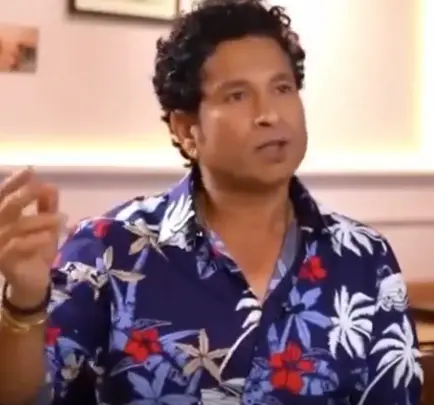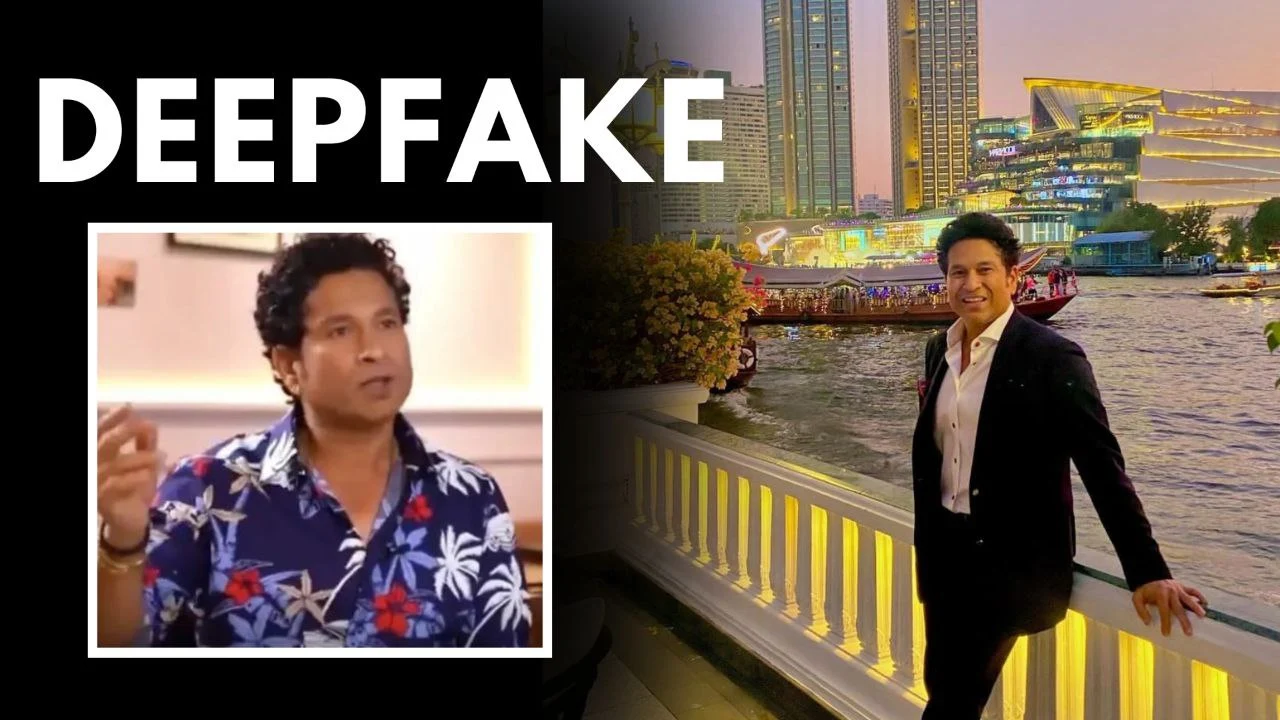In this era of social media and the rising influence of AI technology, Deepfake video cases are on the rise. Even Sachin Tendulkar, the renowned cricketer, has found himself ensnared in the web of Deepfake controversy. A similar incident occurred with Rashmika Mandanna. Explore the full controversy here.
Alert! Sachin Tendulkar’s Deep Fake went viral: What Sachin said On His Deepfake Video?

Recently, a Deepfake video featuring the renowned Indian cricketer Sachin Tendulkar has surfaced. In the fabricated footage, he is purportedly endorsing a gaming app, but this is entirely untrue. The deceptive video is, in fact, a manipulated version of an authentic interview with Sachin Tendulkar. Unfortunately, some individuals with malicious intent misused technology to create this deceptive content.
Sachin Tendulkar’s Reply Over His Fake Video
These videos are fake. It is disturbing to see rampant misuse of technology. Request everyone to report videos, ads & apps like these in large numbers. Social Media platforms need to be alert and responsive to complaints. Swift action from their end is crucial to stopping the spread of misinformation and deepfakes.
ये वीडियो नकली है और आपको धोखा देने के लिए बनाया गया है। टेक्नोलॉजी का इस प्रकार का दुरुपयोग बिल्कुल गलत है। आप सब से विनती है के ऐसे वीडियो या एप या विज्ञापन आपको अगर नजर आए तो उन्हें तुरंत रिपोर्ट करें। सोशल मीडिया प्लेटफार्मों को भी सावधान रहना चाहिए और इनके खिलाफ की गई शिकायत पर जल्द से जल्द एक्शन लेना चाहिए। उनकी भूमिका इस बारे में बहुत जरूरी है ताकि गलत सूचना और खबरों को रोका जा सके और डीपफेक का दुरुपयोग खत्म हो।
In the video, Sachin Tendulkar can be seen endorsing an app named “Skyward Aviator Quest” and asserting that his daughter, Sara Tendulkar, is making significant earnings by playing on this platform. However, upon closer inspection, it becomes evident that the video is fabricated. Sachin Tendulkar is portrayed casually sitting and promoting the app, but the authenticity of the content is questionable.
How does a deepfake work?
Deepfake videos are artificially generated videos created through AI technology. Originally distinct, these videos undergo manipulation using editing tools or graphics to generate deceptive content. Simply put, Deepfake allows the generation and potential misuse of fake videos or photos. This technology seamlessly incorporates individuals into videos or photos they never actually participated in. In this era of social media, the prevalence of Deepfake is increasing, posing potential dangers.
Deepfake is a dangerous and silent virus that is spreading and affecting everyone. People must be aware and refrain from promoting such videos and posts. Social media platforms should take responsibility and not allow the dissemination of these types of harmful content.
How to identify Deepfake video?
With the rising sophistication of deepfake technology, it’s crucial to discern between real and fake videos. Explore key indicators to help identify deep fakes:
- Eye Movement: Detect unusual eye movements in unreal faces.
- Lip Syncing: Uncover giveaways like mismatched lip movements, as observed in the Sachin Tendulkar Deepfake.
- Body Posture or Movement: Spot discrepancies in body posture or movements that deviate from genuine videos.
- Face Edges: Identify visible blurriness around face edges, a common trait in deepfake videos.
- Facial Movement: Pay attention to noticeably strange facial movements characteristic of deepfake videos.
Despite the growing concern, there is currently no specific app or set of rules to definitively identify and combat the Deepfake culture. Governments are actively working towards developing solutions to address and curb the impact of Deepfake videos. Stay informed to navigate the evolving landscape of digital manipulation.
Is deepfake legal or illegal?
Deepfake technology was invented in 2014 by Goodfellow and his team. As for its legality, deepfakes are generally considered illegal as they infringe upon privacy and can be misused for deceptive purposes. In India and many other countries, laws have been enacted to prevent the creation and distribution of deepfake videos without consent. While deepfakes can be created using various AI tools available in the market, their usage is not safe, as it poses significant risks to personal privacy.
The negative aspects of deepfakes include the potential for identity theft, misinformation, and the creation of malicious content. Despite the allure of creating entertaining videos, the misuse of someone’s face or privacy through deepfakes is considered a punishable offence, emphasizing the importance of responsible and legal use of this technology.
